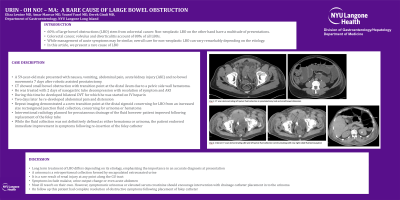Tuesday Poster Session
Category: Colon
P3103 - Urin -oh No!- ma: A Rare Cause of Large Bowel Obstruction
Tuesday, October 24, 2023
10:30 AM - 4:00 PM PT
Location: Exhibit Hall

Has Audio
- EL
Eliza Lewine, MD
NYU Long Island
Mineola, NY
Presenting Author(s)
Eliza Lewine, MD, Amar Manvar, MD, Yousef Fazel, MD, Derek Gindi, MD
NYU Long Island, Mineola, NY
Introduction: 60% of large bowel obstructions (LBO) stem from colorectal cancer. Non-neoplastic LBO on the other hand have a multitude of causes. Colorectal cancer, volvulus and diverticulitis account for 80% of all LBOs. While management of acute symptoms may be similar, overall care for non-neoplastic LBO can vary remarkably depending on the etiology. In this article, we present a rare cause of LBO.
Case Description/Methods: A 59-year-old male presented with nausea, vomiting, abdominal pain, acute kidney injury (AKI) and constipation 7 days after robotic assisted prostatectomy. CT showed small bowel obstruction with transition point at the distal ileum due to a pelvic side wall hematoma. He was treated with 2 days of nasogastric tube decompression with resolution of symptoms and AKI. During this time he developed bilateral DVT for which he was started on IV heparin. Two days later he re-developed abdominal pain and distension. Repeat imaging demonstrated new transition point at the distal sigmoid concerning for LBO from an increased size rectosigmoid junction fluid collection, concerning for a urinoma or hematoma. Interventional radiology planned for percutaneous drainage of the fluid however patient improved following placement of a foley catheter. While the fluid collection was not definitively defined as either hematoma or urinoma, the patient endorsed immediate improvement in symptoms following re-insertion of the foley catheter.
Discussion: Long term treatment for LBO differs depending on its etiology, emphasizing the importance in an accurate diagnosis at presentation. A urinoma is a retroperitoneal collection formed by encapsulated extravasated urine. It is a rare result of renal injury at any point along the GU tract. Symptoms include malaise, urine output changes or even acute abdomen. Most will resorb on their own. However, symptomatic urinomas or elevated serum creatinine should encourage intervention with drainage catheter placement into the urinoma. In this case, symptoms resolved with interval placement of a foley catheter. On follow up this patient had complete resolution of obstructive symptoms following placement of foley catheter.
Disclosures:
Eliza Lewine, MD, Amar Manvar, MD, Yousef Fazel, MD, Derek Gindi, MD. P3103 - Urin -oh No!- ma: A Rare Cause of Large Bowel Obstruction, ACG 2023 Annual Scientific Meeting Abstracts. Vancouver, BC, Canada: American College of Gastroenterology.
NYU Long Island, Mineola, NY
Introduction: 60% of large bowel obstructions (LBO) stem from colorectal cancer. Non-neoplastic LBO on the other hand have a multitude of causes. Colorectal cancer, volvulus and diverticulitis account for 80% of all LBOs. While management of acute symptoms may be similar, overall care for non-neoplastic LBO can vary remarkably depending on the etiology. In this article, we present a rare cause of LBO.
Case Description/Methods: A 59-year-old male presented with nausea, vomiting, abdominal pain, acute kidney injury (AKI) and constipation 7 days after robotic assisted prostatectomy. CT showed small bowel obstruction with transition point at the distal ileum due to a pelvic side wall hematoma. He was treated with 2 days of nasogastric tube decompression with resolution of symptoms and AKI. During this time he developed bilateral DVT for which he was started on IV heparin. Two days later he re-developed abdominal pain and distension. Repeat imaging demonstrated new transition point at the distal sigmoid concerning for LBO from an increased size rectosigmoid junction fluid collection, concerning for a urinoma or hematoma. Interventional radiology planned for percutaneous drainage of the fluid however patient improved following placement of a foley catheter. While the fluid collection was not definitively defined as either hematoma or urinoma, the patient endorsed immediate improvement in symptoms following re-insertion of the foley catheter.
Discussion: Long term treatment for LBO differs depending on its etiology, emphasizing the importance in an accurate diagnosis at presentation. A urinoma is a retroperitoneal collection formed by encapsulated extravasated urine. It is a rare result of renal injury at any point along the GU tract. Symptoms include malaise, urine output changes or even acute abdomen. Most will resorb on their own. However, symptomatic urinomas or elevated serum creatinine should encourage intervention with drainage catheter placement into the urinoma. In this case, symptoms resolved with interval placement of a foley catheter. On follow up this patient had complete resolution of obstructive symptoms following placement of foley catheter.
Disclosures:
Eliza Lewine indicated no relevant financial relationships.
Amar Manvar indicated no relevant financial relationships.
Yousef Fazel indicated no relevant financial relationships.
Derek Gindi indicated no relevant financial relationships.
Eliza Lewine, MD, Amar Manvar, MD, Yousef Fazel, MD, Derek Gindi, MD. P3103 - Urin -oh No!- ma: A Rare Cause of Large Bowel Obstruction, ACG 2023 Annual Scientific Meeting Abstracts. Vancouver, BC, Canada: American College of Gastroenterology.
